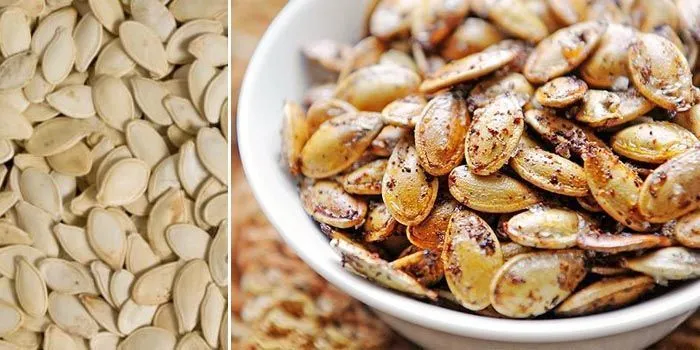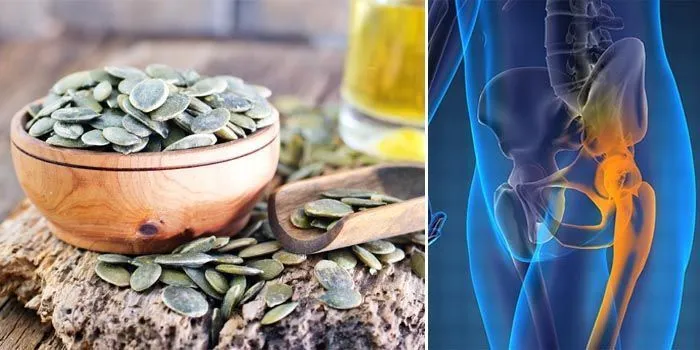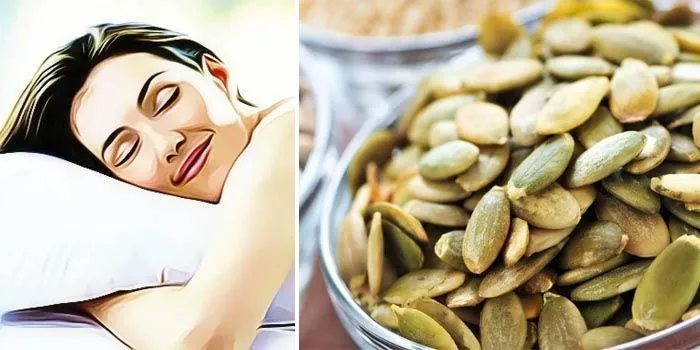From the pumpkin you can take advantage of practically everything, including pumpkin seeds, which are edible and highly valued in different countries.
Like many other seeds or pipes that we have been discussing, they are full of nutrients, vitamins and fiber, since they need a lot of energy to stimulate germination if they are planted.
Currently, we have the possibility of buying them in the supermarket, in bags prepared with aguasal or directly without salt. Ingesting a small amount of pumpkin seeds can provide us with a significant amount of healthy fats, magnesium and zinc, among other compounds.
The benefits of these seeds is that they are easy to incorporate into our diet, have a pleasant flavor and increasingly there are different options of presentation and mixture with other ingredients.
Table of Contents
Nutritional composition

An amount of 100 grams of pumpkin seeds provides us with the following nutritional contribution:
- Energy: 536 kcal
- Carbohydrates: 4 g
- Fibre: 3.6 g
- Proteins: 32.1 g
- Fats: 42.9 g (8.9 g saturated)
As for the concentration of minerals:
- Calcium: 78 mg
- Magnesium: 90.7 mg
- Sodium: 20.56 mg
- Zinc: 7.99 mg
- Iron: 9.75 mg
Product Valuation
High magnesium content
One of the mineral values that most predominate in pumpkin seeds, at a nutritional level, is the high magnesium intake.
Magnesium is very important for fulfilling physiological functions in animals, including the manufacture of energy through ATP, RNA and DNA synthesis.
Magnesium, in balanced amounts, activates the regulation of blood pressure and benefits in the prevention of cardiovascular diseases.
We tell you some Additional Benefits of Magnesium contributed by pumpkin seeds
- Formation and maintenance of healthy bones.
- Controlling blood pressure.
- Regulation of blood sugar levels.
- Reduced risk of heart disease.
Enriched source of zinc
The WHO (World Health Organization) considers that an adult male should take 15 mg of zinc a day, and an adult woman 12 mg.
As we have seen in the table above, the contribution of zinc per pumpkin seeds per 100 g is practically 8 mg, more than half of what we need daily.
This mineral can be obtained from foods such as pork, eggs, etc. But if we opt for a vegetarian diet, pumpkin seeds are the most important source of zinc we can find.
The importance of zinc in health and its benefits:
- Activates the immune system
- Participates in cell division and cell development
- Increases the effect of insulin (ideal for diabetics)
- Muscle weakness
- Weight loss
- Reduction in wound healing
If we have diagnosed in blood tests a lack of zinc content, the most practical way to increase it quickly, in addition to food supplements, is with pumpkin seeds.
Pumpkin and prostate seeds

The European Medicines Agency (EMA) has published in its reports the benefits of consuming this type of snack on the prostate and discomfort when urinating or urinating.
Daily consumption of 10 to 15 grams of these seeds allows to increase the activity of the prostate and reduce the need to urinate continuously.
The effect that has been studied and identified in animals is that of the reduction of the size of the prostate, so it is indicated, without side effects, for as a complement in the treatment of benign prostatic hyperplasia.
However, it is too early to obtain conclusive results that guarantee a concise confirmation by the World Health Organization (WHO)
Unsaturated fats type Omega 3
Of the total fats and fatty acids provided by pumpkin seeds, 80% belong to the group of unsaturated and healthy fats. Especially noteworthy is the high content of Omega 3 (almost 1 grams per 100 grams), which comes from alpha-linolenic acid.
We already talked about this compound in the hemp seeds and its importance in the prevention of cardiovascular diseases (it is linked to the contraction and expansion of the arteries).
We are therefore talking about healthy fats for the body.
Reduction of bad cholesterol
A scientific study evaluated the response of pumpkin seed oil (high in unsaturated fatty acids) and its potential against bad cholesterol or HDL.
The habitual consumption of this food significantly increased the concentrations of high-density lipoprotein cholesterol (healthy fats), favoring a decrease in diastolic blood pressure and the improvement of the ability to pump blood and prevent heart attacks. [See study]
Reduces the effects of menopause
The same previous study intertwined the results of habitual pumpkin seed consumption and the effects of postmenopausal symptoms.
The investigations resulted in a decrease in the intensity of hot flashes, reduction of headache and in the joints.
Health Benefits of the Skin and Eyes
A very important component present in pumpkin seeds is the squalene. This organic compound increases the immune response and is associated with antioxidant beta-carotene.
Therefore, the consumption of pumpkin seeds is associated with better eye health due to the source of vitamin A, helping to keep the mucous membranes, skin and bones in good condition.
There are scientific studies, although today they are not conclusive, that relate squalene with the health of the ocular retina.
Animal studies have also suggested that the squalene present in these pipes may play an important role in retinal health.
Tryptophan and insomnia

The amino acid tryptophan is an indispensable element to maintain proper health and allow a correct formation of proteins. This amino acid is present in pumpkin seeds.
Among the benefits related to tryptophan we can find the following examples:
- Has influence and activity on mood
- It is part of the main structure of many proteins
- Tryptophan, when synthesized to produce serotonin, is related to appetite activation processes.
- This same serotonin is also linked to sleep and disorders related to lack of rest.
A 2005 scientific study published in Nutritional Neuroscience related the same intensity in concentration of tryptophan bought in pharmacies as a supplement and the one that we can consume with pumpkin seeds. [Study]
With this, in people who suffer from sleep disorders, deficiencies related to the lack of tryptophan in the body (and, therefore, serotonin) can be corrected through pumpkin seeds.
Having a few pumpkin seeds before bed, with a small amount of carbohydrates, such as a fruit, can be beneficial in providing your body with the tryptophan needed for melatonin production.
What daily amount of pumpkin seeds to take?
It is recommended to take between 25 and 30 grams of pumpkin seeds, the equivalent of 2 or 3 tablespoons of this food. This can be combined with other nuts such as nines, pistachios or almonds, rich in fatty acids.
However, keep in mind that its caloric power is high and therefore, the daily amount that is usually recommended is not very high.
These 25-30 grams provide about 130 kcal.
Benefits and dietary advice

Pumpkin seeds can be eaten alone as a snack (nuts, pistachios, hazelnuts, etc.) or added to dishes for extra flavor and a crunchy texture.
Some dishes where you can add them
- Salads with pumpkin seeds.
- Prepare (or buy) and mix of nuts with a mixture of nuts, pumpkin seeds, hazelnuts, macadamia nines, etc.
- Toast the seeds to give an extra crunch and increase the depth of its flavor.
You can buy pumpkin seeds in Mercadona or any other large surface. The only thing you will have to look for is that they are natural or toasted and without additions such as salt or other ingredients that provide empty calories.
The bags that are usually sold have a weight of 150 grams, approximately 5 or 6 servings.
Contraindications
It is possible that some people may suffer from some negative symptoms when they ingest moderately high doses of pumpkin seeds.
Allergies
There have been rare cases of allergies caused by the active ingredients of these pipes. However, these symptoms are very mild and show a picture of eczema, rash or irritation on the skin.
In some cases, symptoms with throat irritation, redness and swelling may appear.
Digestive problems
Although fiber has always been linked to an improvement of the digestive system, take a big leap and incorporate a high content of this compound in an unaccustomed body.
